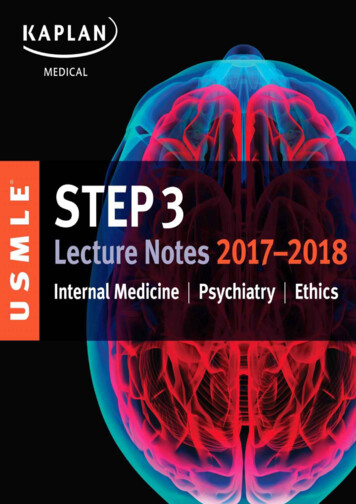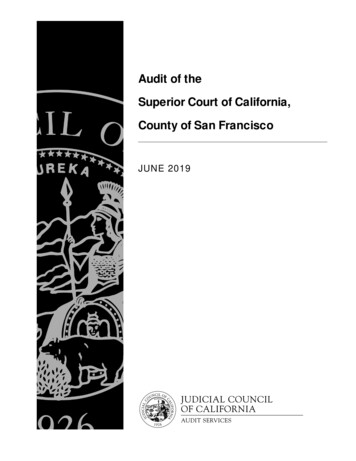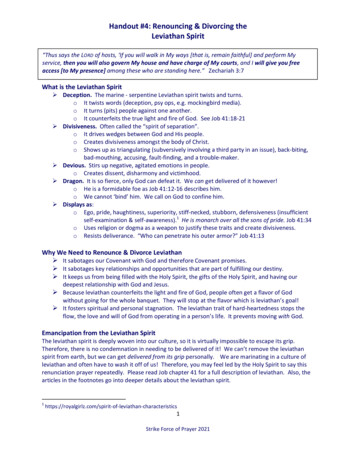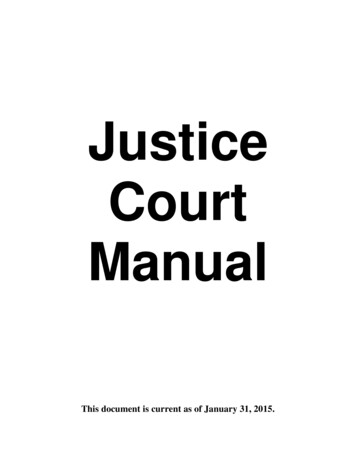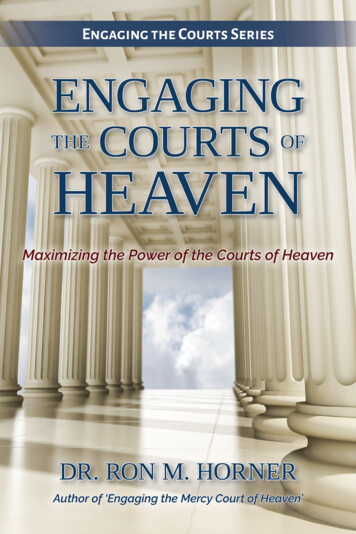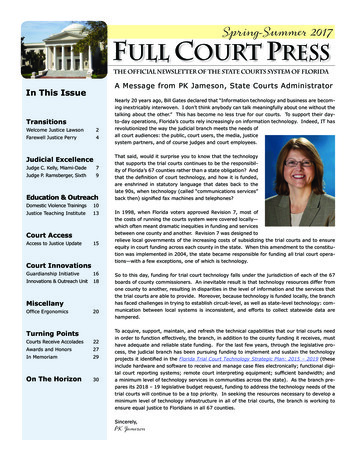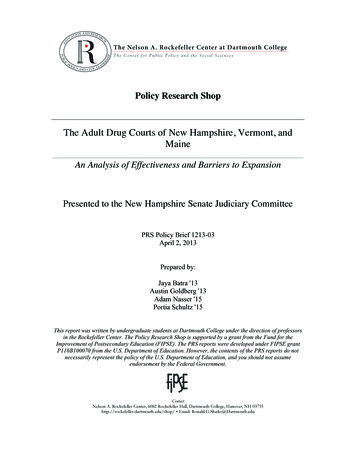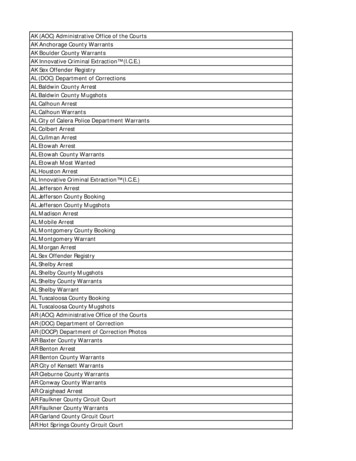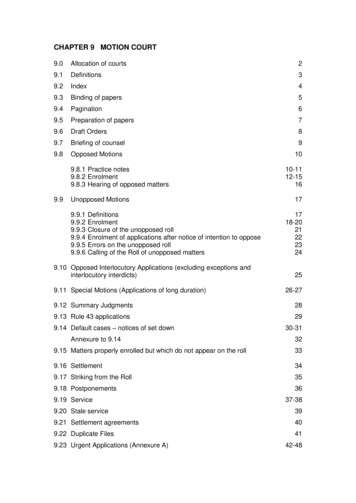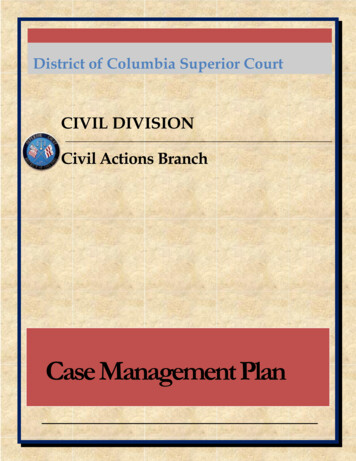
Transcription
District of Columbia Superior CourtCIVIL DIVISIONCivil Actions BranchCase Management Plan
Table of ContentsPurpose . 4Performance Measures . 4Age of Active Pending Caseload . 4Time to Disposition. 4Excludable Time . 4Trial Date Certainty . 6Caseflow Management . 6Judicial Assignments . 7Case Types in the Civil Actions Branch . 7Cases Heard by Judge in Chambers (JIC). 8Temporary Restraining Order. 9Legal Assistance . 10Clerk’s Office Information . 11Electronic Filing and Case Management System . 12Filing Fees . 12Waiver of Court Costs . 12Filing a Case . 13Housing Conditions Calendar Complaint . 14Initial Order . 14Serving the Defendant . 15Process Server . 15Registered or Certified Mail . 16First Class Mail . 16Filing an Answer . 16Filing a Motion . 16Filing an Opposition . 17Entry of Default . 17Servicemembers Civil Relief Act . 17Default Judgment . 17Ex Parte Proof Hearing . 18Dismissal of Actions . 192
Initial Scheduling Conference . 20Scheduling Orders . 20Alternative Dispute Resolution (ADR) . 22Types of ADR . 23Mediation . 23Case Evaluation . 23Arbitration. 23Pretrial Conference . 23Trial . 24Entry of Judgment. 24Collection of Judgment . 25Oral Examination Hearing. 25Notice of Appeal . 25Notice of Removal. 25Remand. 26Civil Actions Case Flow . 273
PurposeAll cases filed in the Civil Division, Civil Actions Branch of the Superior Court of theDistrict of Columbia are to be determined in a just, speedy and inexpensive manner inaccordance with the Superior Court Rules of Civil Procedure. The purpose of this casemanagement plan is to give parties a broad understanding of case management in theCivil Actions Branch within the scope of the rules. It details the actions the court takes tomonitor and control the progress of a case, from initiation through final disposition, andto ensure prompt resolution consistent with the individual circumstances of the cases.This plan is not a substitute for the advice of a lawyer. The law can be very complicated,and it is not possible to address every situation in one document. Parties are stronglyencouraged to talk to a lawyer to help protect their legal rights. The Superior Court Rulesof Civil Procedure can be accessed on the court’s website for more information.Performance MeasuresIn 2005, the District of Columbia Courts’ policy making body, the Joint Committee onJudicial Administration, adopted a set of nationally recognized measures to assess andreport on the court’s performance of timely and efficient resolution of cases. Performancemeasures address outcomes the court strives to achieve in order to deliver justiceeffectively and enhance accountability to the public.Performance assessments allow the court leadership to monitor operational efficiency andassess how well the court is doing in achieving its goals. In order to assess the court’sperformance and monitor cases, the Age of Active Pending Caseload, Time to Disposition,and Trial Date Certainty performance reports have been adopted.Age of Active Pending CaseloadThe Age of Active Pending Caseload report measures the length of time a case is pendingbefore the court from the date of filing to the time of measurement. This report is used inconjunction with the Time to Disposition report to monitor the caseload. Tracking thesereports allows the court to monitor and focus attention on cases approaching the court’stime standards. Excludable time, defined as periods of case inactivity beyond the court’scontrol, is not included in the Age of Active Pending Caseload Report.Time to DispositionThe Time to Disposition Report measures the number of cases disposed or resolved withinthe court’s established timeframes. This report assesses the time it takes the court toprocess cases. It is used to observe trends and to assure the effective use of resources.Excludable time is not included in the Time to Disposition Report.Excludable TimeThe court has defined events that constitute excludable time for the Age of Active PendingCaseload and Time to Disposition reports. These are events that prevent movement of thecase to disposition and are out of the court’s control.4
The excludable events for civil actions cases are: interlocutory appeal from stay entered to stay liftedbankruptcy stay entered to stay liftedmilitary stay entered to stay liftedother stay that precludes any activity in case to stay liftedancillary proceeding that precludes all other activity in case to resolution ofancillary proceedingqui tam cases during period of seal to seal liftedTime to Disposition: Performance StandardsCase TypeDisposition Standard(98% disposed within)Administrative Proceedingsand Judge-in-Chambers90 daysLandlord and Tenant Jury270 daysSmall Claims JuryHousing ConditionsTraffic Adjudication Appeals365 daysLibel of Information14 monthsVehicleMerit Personnel Act andOther Agency Appeals18 monthsGeneral Civil II Complaints24 monthsCollection and SubrogationCases30 monthsCivil I Complaints36 monthsTitle 47 Tax Lien Cases5
Trial Date CertaintyTrial Date Certainty measures the number of times cases disposed by trial were scheduledfor trial. The report is used to assess whether cases were tried on the first date they wereset or continued before they actually began. Setting credible trial dates encourages properpreparation by all parties, furthers the interests of litigants and the public in timely justice,helps to assure effective calendaring of cases and utilization of resources, and promoteshigh quality justice. The report also provides reasons for continuances to assess trends andmonitor trial performance goals. The Civil Division’s goal is to dispose of 85% of jury trialcases and 90% of bench trial cases within 2 trial settings.Caseflow ManagementConsistent intervention by the court ensures proper caseflow. For that reason, every opencase must have a future hearing date. Consistent scheduling of events increases the levelof judicial attention and case control necessary to achieve the court’s performance goals. Inorder to achieve its performance goals the division has implemented case processingtechniques to monitor and control the progress of cases through resolution. Thesetechniques include: Early and continuous electronic caseload monitoring; Differentiated case management plans; and Alternative Dispute Resolution (ADR)The Civil Division has implemented electronic caseload inventory reports that monitor ona monthly basis the division’s clearance rates. Clearance rates are calculated as thenumber of outgoing cases as a percentage of the number of incoming cases. Clearancerates measure whether the court is processing its incoming caseload timely to minimize abacklog of cases. Other reports provide data for trials held, pending motions, matterstaken under advisement and cases without a future event. These reports are monitoredfrequently by the judges and court administrators to manage and control caseflow andensure accurate case activity reporting. The Civil Division is able to identify emergingareas of concerns and pinpoint areas for development by continuously monitoringcaseloads.The Division’s differentiated case management (DCM) plan provides for the assignment ofcases to “tracks” with deadlines for each action to be taken in a case through the pre-trialconference. A case is assigned to a specific "track" at the scheduling conference, the firsthearing. The tracks are customized for specific case types with standardized time periods toexchange witness lists, complete discovery, file motions, complete ADR, and hold apretrial/settlement conference before the judge. For instance, there are three tracks for CivilII cases, two tracks for Medical Malpractice cases and four tracks for Vehicle Accident cases.Landlord and tenant and small claims jury cases have a specific fast track. This planencourages meaningful pretrial conferences before judges. Most trial dates are establishedonly after pretrial conferences are held and all ADR efforts have been completed. Thisprocess assists judges with continuous case control and scheduling firm trial dates.6
In addition to early judicial intervention, the division uses ADR methods such as mediation,arbitration, and case evaluation to attempt to resolve cases as early as possible throughtrained ADR professionals provided by the Multi-Door Dispute Resolution Division, mostcivil cases are resolved prior to trial through alternative dispute resolution. The method andschedule for ADR is selected at the scheduling conference.Judicial AssignmentsThe Civil Division has 16 Associate Judges including a Presiding Judge and DeputyPresiding Judge, has four Magistrate Judges and uses a rotation of Senior Judges. Thedivision employs an individual calendaring system and each Associate and/or MagistrateJudge is assigned to a specific calendar. Two judges are assigned to Civil 1 calendars,which include complex cases such as toxic mass torts and asbestos. Twelve AssociateJudges are assigned to Civil II calendars and a rotation of Senior Judges are assigned to the2nd Landlord and Tenant courtroom (B-53). A Magistrate Judge is assigned to theLandlord and Tenant courtroom on Mondays and Fridays and Associate Judges areassigned Tuesday, Wednesdays and Thursdays. Three Magistrate Judges are assigned tothe Small Claims, Title 47 Tax Lien and Collections and Subrogation Calendars and assistwith Mortgage Foreclosure cases. A written consent must be filed to have the case heardby a Magistrate Judge. If the parties do not consent to a Magistrate Judge, the case isassigned to an Associate Judge. The individual calendaring system randomly assigns casesto individual judges, according to the cause of action, when a case is filed to encourageresolution through early judicial attention and intervention.Case Types in the Civil Actions BranchThe Civil Actions Branch is responsible for processing all civil cases requesting damagesabove 10,000 or equitable relief and cases that affect an interest in real property. Civilcases requesting equitable relief are those seeking a court order that either directssomeone to do something (perform an action or prevents them from doing something.These types of actions are commonly known as seeking injunctive relief. Actions seekingdamages that are 10,000 or less must be filed in the Small Claims and ConciliationBranch. The Landlord and Tenant Branch handles all actions for the possession of realproperty.Each case that is accepted for filing is initiated in the case management database andassigned a case number. The case number is assigned automatically and identified bythe cause of action (action code). Based upon the cause of action, each case is categorizedinto a case type and tracked for statistical purposes and performance standards.7
The Civil Actions Branch processes the following case types:Case TypeCase DescriptionCA1JIC (1)CA2JIC (2)CA3JIC (3)CAACivil I (A)CABCACCivil II (B)Collections/Insurance Granted (C)CADCollections/Insurance Denied (D)CAEEminent Domain (RP)CAFCAHForeign Judgment / Libel (F)Housing Code Regulations (H)CALTitle 47 (RP)CAMMalpractice (M)CAOOther Administrative Reviews (O)CAPCARMerit Personnel Act (P)Real Property (RP)CASStructured Settlement (S)CATTraffic Adjudication Appeals (T)The housing code regulations cases (housing conditions calendar cases), collection andsubrogation cases, Title 47 tax sale cases and mortgage foreclosure cases are distinct casetypes with special rules, processes and available legal resources. The differences forthese case types are discussed as appropriate throughout the plan. To access civil actioncases online, refer to the following -onlineCases Heard by Judge in Chambers (JIC)Certain matters are heard by the Judge in Chambers after they are filed in the CivilActions Branch. The Judge in Chambers office is responsible for handling emergencymatters during the court’s normal business hours that require expedited judicial decisionmaking. The office is located in the Moultrie Courthouse, Room 4220. When filed on thesame day of the complaint, the following matters must be heard by the Judge inChambers:Appointment ofa special processserverApplications toset bondsMotionsregardingsecurity for costsMotions with respect topublication of noticerequirementsApplications for temporaryrestraining ordersWrits ofne exeatJudicial approval ofsettlementsinvolving minorsWrits of attachmentbefore judgmentMotions forprotective ordersbarring access tocourt documents8Motions to use pseudonymsin any pleading or paperfiled in a caseLibel of information casesWrits of replevin
Temporary Restraining OrderA temporary restraining order (TRO) is typically issued in circumstances requiringimmediate action and orders short term relief. A TRO lasts approximately 14 days. Ajudge can order a party to do or not do something for that brief period of time, includingstaying away from and/or having no contact with the movant. If filed on the same dayof the complaint, TROs are scheduled to be heard in Judge in Chambers. At the hearingon a TRO Motion, the moving party must show the judge that he or she provided noticeto the other party. If the other party did not receive notice, or they do not appear at thehearing, the judge may continue the hearing or deny the TRO Motion. The parties shouldcome prepared with any evidence or witness testimony that would support the requestfor a TRO.Requests for injunctive relief that last longer than 14 days are called requests for apreliminary injunction (PI). Preliminary injunction hearings are heard by the AssociateJudge assigned to the case. A status hearing on the preliminary injunction will be set bythe clerk in the Judge in Chambers Office before the Associate Judge. A party may file arequest for a TRO, a PI, or both.A complaint must be filed in order to file a Motion for TRO or PI. It is not necessary tofile a motion for both types of relief. Each request for relief -- 1) temporary restrainingorder, and 2) preliminary injunction – requires a fee of 20 each. In addition to the filingfee for the motion(s), the party must pay the 120.00 filing fee for the complaint.9
Motion forPreliminaryInjunctionMotion ormationSheetLegal AssistanceAn individual may file a complaint in the Civil Actions Branch on his or her own behalfwithout the assistance of an attorney. A person who is not an attorney may not file a caseon behalf of another person or a business. Corporations and certain other businesses thatare plaintiffs in cases must be represented by an attorney at all times, including when thecomplaint is filed.If a person wishes to proceed without an attorney, the clerk’s office can answer basicquestions about how to fill out forms and give other general information. The clerk’s officecannot give legal advice. Individuals are strongly encouraged to seek the advice of anattorney. The clerk’s office is not allowed to answer questions about what to ask the court,whether someone can be sued for a particular reason, how likely it is that a case will besuccessful or any other issue that will affect legal rights.The resources below are available to assist with certain civil actions matters. The resourcecenter is coordinated by the D.C. Bar Pro Bono Center and is not staffed by courtemployees. They must be contacted directly for their hours of operations and procedures.Legal Services for Self-Represented Parties10
Consumer LawResource CenterConsumer LawCourt-BasedLegal ServicesProjectFree information for unrepresented consumerswith consumer law matters governed by D.C. law,including Debt Collection, Home Improvement/Independent Contractor Disputes, SecurityDeposit Refunds, Small Claims Cases, Used Car orCar Repair Disputes, Utility Disputes, andViolations of the Consumer Protection ProceduresActSame day representation for eligible defendants incollections cases and foreclosure casesWednesdays9:15 a.m. to 12:00 p.m.510 4th St., NW, Building BRoom 208Washington, DC 20001FridaysCollections Cases: Courtroom B-52Foreclosure Cases:Courtrooms 212 and 214The D.C. Bar ProBono Center FreeLegal ClinicFree assistance with any civil legal problemgoverned by D.C. law or federal law includingbankruptcy/debt collection, civil rights, consumerlaw, employment law, health law, housing law,personal & property damage, public benefits andtax law2nd Sat. of month 10 a.m. - 12 p.m.at two locations:Bread for the City—NorthwestCenter, 1525 7th St. NW and,Bread for the City—SoutheastCenter, 1640 Good Hope Rd. SE.The D.C. BarLegalInformation HelpLineAutomated system of recorded messages givingbasic information on more than 30 legal topics,finding an attorney, and the availability of freelegal services in D.C.202-626-349924 hours a day, seven days a weekin Amharic, Chinese, English,French, Korean, Spanish, andVietnameseClerk’s Office InformationThe Civil Actions Branch, Civil Actions Clerk’s office is located at 500 Indiana Avenue,N.W., Washington, D.C., 20001, Moultrie Courthouse Building, Room 5000. The office isopen weekdays from 8:30 a.m. to 5:00 p.m. and Saturdays from 9:00 a.m., to12:00 p.m. (document filing only on Saturdays).The Civil Actions Branch processes all filings submitted in person and electronically.Requests for default judgments and execution of post-trial judgments including writs ofattachment are also processed by the Civil Actions Branch. Individuals who are notrequired to file electronically can file, and documents that are not accepted electronicallycan be filed, in the Civil Actions Clerk’s Office. Documents can also be submitted throughU.S. Postal mail and via the afterhours drop box located in the lobby of the MoultrieCourthouse.The Quality Review Branch, also located in Room 5000, assists with monitoring andcontrolling the progression of cases by processing dismissals, entry of defaults, requestsfor ex parte proof hearings and notices of appeal. This branch schedules initial hearings,issues and reviews notices of hearings and issues service of process for litigants withprepayment of costs waived (in forma pauperis or “IFP”). This branch also manages thecourtroom staff.11
The Clerk’s Office may be contacted via telephone, email, and internet chat line duringnormal business hours as follows:Civil Actions Clerk’s Office: (202) 879-1133Information & Records Section: (202) 879-1968Judgment Office: (202) 879-1140Quality Review Branch: (202) 879-1750Email Address: CivilDocket@dcsc.govThe Civil Actions Branch live chat feature is available Monday through Friday from 8:30a.m. –5:00 p.m. at: ectronic Filing and Case Management SystemThe Civil Division has a paper on demand process. All parties are required to keep theoriginal unaltered documents through the final resolution of all appeals. SeeAdministrative Order 2014-11. Self-represented parties may file documents in paper in theCivil Actions Clerk’s Office. The clerk will return the original documents once scannedinto the case management system.Documents filed by a member of the DC Bar must be submitted electronically via Fileand Serve. All filing fees are collected via CaseFileXpress. See Administrative Order2015-03, Administrative Order 2006-07, and Administrative Order 2005-04). Lawschools and legal services organizations that provide direct civil legal services to lowincome and underserved litigants listed in Administrative Order 2007-14 are exemptfrom mandatory e-filing.Although lawyers are required to file and serve documents electronically, self-representedlitigants are not but may register to do so. Please see DC Superior Court E-filing for moree-filing services information through File & Serve Xpress. There are certain case-typesthat are exempted from electronic filing.Filing FeesFiling fees can be paid by cash, certified check, credit card (American Express, Discover,Visa or MasterCard), personal check or money order. The check should be made payableto: “Clerk, D.C. Superior Court” and must be presented in person with proper ID. AllFiling Fees can be accessed on the internet.Waiver of Court CostsIf a party is unable to pay court costs, fees, or security without substantial hardship, thecourt may waive the requirement to prepay court costs. See Super. Ct. Civ. R. 54-II. Whenthe court waives prepayment of court costs, it is called “in forma pauperis,” “IFP” or“without prepayment of costs.” To request the court waive prepayment of court costs, anApplication to Proceed Without Prepayment of Costs form must be filed.A judge may approve the application with or without a hearing. When a request to12
proceed without prepayment of costs is granted, the court is only responsible for servingthe complaint, summons, initial order and all subpoenas on behalf of an in forma pauperislitigant. If IFP status is granted, it does not completely waive responsibility to pay courtcosts. A judge could order a person to pay the court costs at the end of the case.Filing a CaseForms are provided for use by litigants on the courts website -location?location civilactions.For easy access, links have been provided throughout this document when referencing aform. All documents must be on white paper, size 8-1/2” x 11”.The plaintiff must submit a Complaint, Summons for each defendant and InformationSheet to file a case. The complaint must contain: 1) the grounds for the court’s jurisdiction;2) a short and plain statement of the claim showing that plaintiff is entitled to moneyor some action by the defendant; and 3) a demand for a judgment against the defendant.The complaint must include enough facts which show the plaintiff is entitled to the reliefsought from the court.The complaint and subsequent papers must include the plaintiff’s full name, residenceaddress, and unless the plaintiff is represented by counsel, the telephone number. SeeSuper. Ct. Civ. R. 10-I. If a party is represented by counsel, all pleadings or other papersshall set forth the name, office address, telephone number, e-mail address, and barnumber of the attorney.The names, addresses, and telephone numbers provided will be conclusively deemed tobe correct and current. The plaintiff’s address must be included on the complaint form atthe time of filing. If no address is included on the complaint, the clerk will not accept thecomplaint. The complaint must be signed by the plaintiff or plaintiff’s attorney. The costfor filing a complaint is 120.00 except for a Housing Code Regulations Complaint whichis 15.00. The clerk will review the complaint and if accepted, date, sign and assign a casenumber.A summons is required for each defendant named in the complaint. The summonsprovides a deadline within which the defendant must file a response to the complaintand the possible consequences that may occur for failure to respond within theprescribed timeframe. The clerk will sign and seal each summons for issuance to thedefendant(s). There is no fee for the initial summons filed for a defendant, the initialsummonses to more than one address for a defendant or for service against the District ofColumbia or the Mayor. If the plaintiff requests another summons to be served on thedefendant after the initial summons, it is called an alias summons. The cost for an aliassummons is 10.00 each.The information sheet is a form that provides basic information including the parties’names, demand amount and nature of the case. It is an internal document that is used to13
enter information into the case management system to initiate the case.Housing Conditions Calendar ComplaintOn the Housing Conditions Calendar, tenants may sue landlords for D.C. Housing Codeviolations on an expedited basis. The action is limited in nature and only available forthose seeking to enforce compliance with D. C. Housing Code Regulations (14 D.M.R. §§500 - 900, 1200). A specific Housing Code complaint and summons must be completed bythe plaintiff-tenant. The instructions on how to file a complaint and instructions for serviceare on the court’s website.Initial OrderAfter the case is processed and a judge is assigned, the clerk prepares an Initial Orderthat is attached to the original complaint. The Initial Order is a computer generatedform that includes the following information: the deadline for the plaintiff to file proof of serving each defendantthe deadline for the defendant to answer the complaintthe name of the judge assigned to the casethe number and location of the judge’s courtroomthe time and date of the initial scheduling conference14
Components of the Complaint Package:ComplaintInitial Order(Prep
above 10,000 or equitable relief and cases that affect an interest in real property. Civil cases requesting equitable relief are those seeking a court order that either directs someone to do something (perform an action or prevents them from doing something. These types of actions are commonly known as seeking injunctive relief. Actions seeking
